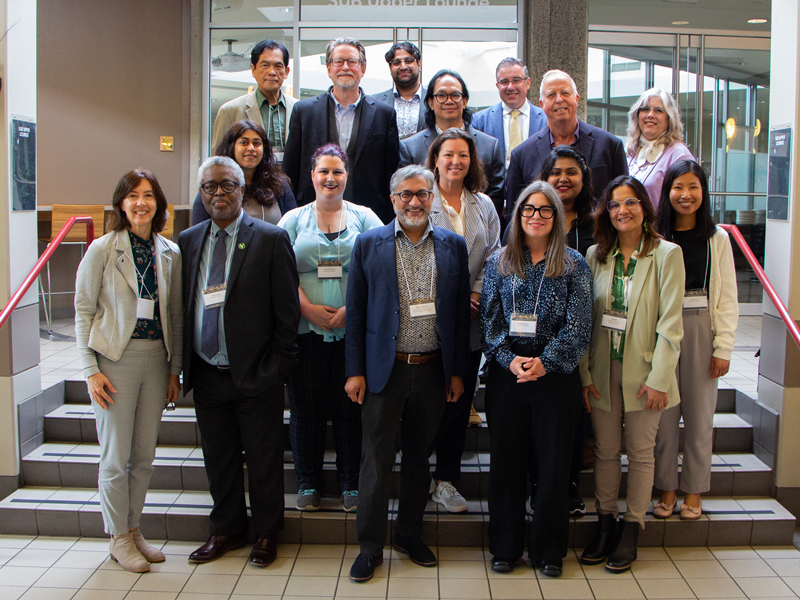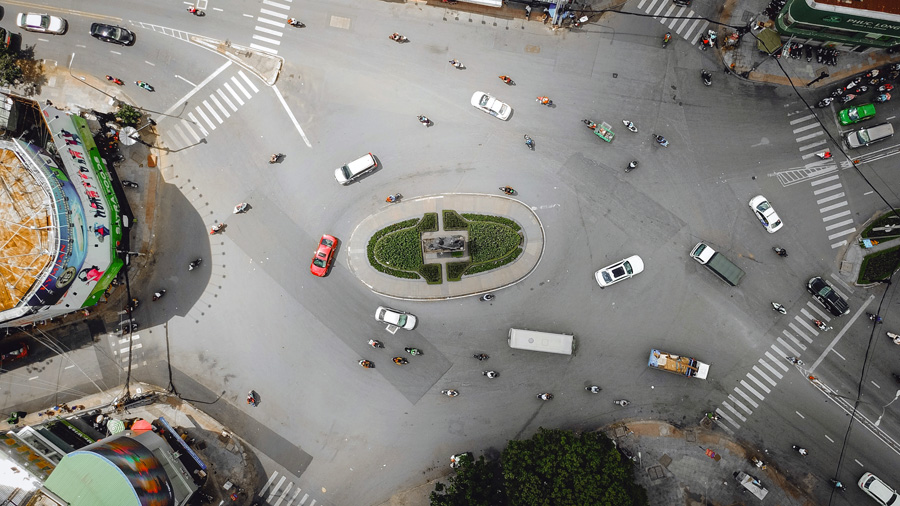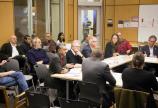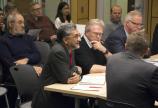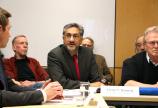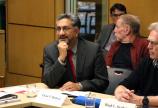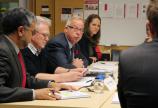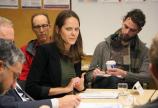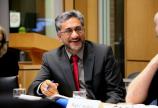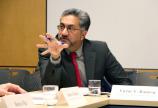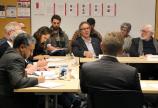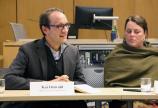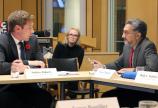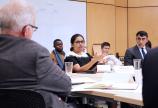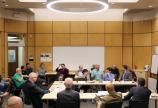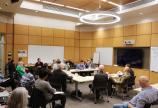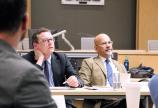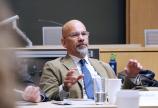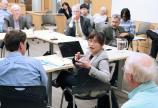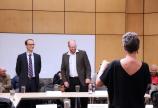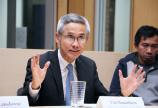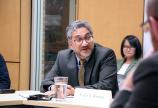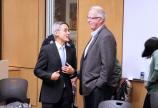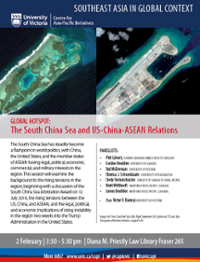Southeast Asia in Global Context
Roundtable discussion series
Situated between India and China, along the busiest maritime sea routes in the world, Southeast Asia remains today at the crossroads of ideas, commerce, migration, language, religion, and law, as it has for centuries. With a total population greater than that of the European Union, the countries of Southeast Asia have been working through the ASEAN—the Association of Southeast Asian Nations—to integrate their economies and cooperate politically and economically on matters of common concern, increasing the region’s influence on global affairs. This roundtable series situates contemporary Southeast Asia in Asia and the wider world, examining the many ways the pressing issues in the region affect us all.
Industries of the Future in ASEAN/Trust-Building in Canada and Thailand
Thursday 23 October 2025 | 1:30PM-5:00PM | FRA 145 University of Victoria
Panel 1: Trust-Building in an Age of Uncertainty: Thai & Canadian Perspectives
As global tensions rise and democratic norms face increasing pressure, how are domestic politics and public trust in government evolving in Canada and Thailand? This panel explored the current state of public confidence in both countries, unpacking the unique and shared challenges they face. From shifting geopolitical dynamics—such as US-China rivalry and the spread of authoritarian influence—to the impact of economic uncertainty and disruptive geopolitics, panelists examined how global trends are reshaping national politics. The discussion also delved into what drives public distrust, what solutions are emerging, and whether effective responses lie within national borders or require transnational cooperation. Can trust be rebuilt—and if so, how? This was a critical and comparative conversation on the future of democratic governance in an interconnected world.
- Patricia Cochran, Associate Professor, Faculty of Law, University of Victoria
- Kowit Kangsanan, Associate Professor of Public Administration, NIDA, Bangkok, Thailand
- Stithorn Thananithichot, Director, Research and Development Office, King Prajadhipok’s Institute, Bangkok, Thailand
- Moderators: Victor V. Ramraj & Phil Calvert, Centre for Asia-Pacific Initiatives (CAPI)
Panel 2: Canada-ASEAN Engagement in a Changing World: Industries of the Future
Southeast Asia is rapidly transforming into a dynamic hub of technological innovation, with emerging sectors such as artificial intelligence, green tech, and digital infrastructure reshaping the region’s economic and social landscape. This panel explored the evolving tech ecosystem in Southeast Asia, identifying key trends and technologies that are likely to define its future. Panelists considered how countries across the region are responding to both the opportunities and challenges of these developments—and how Canada, through its companies, governments, and research institutions, can effectively engage with these changes. The discussion focused on practical strategies for building meaningful partnerships in an increasingly volatile world.
- Daniela Damian, Professor, ECS-CAPI Chair in Inclusive Science, Technology & Engineering, University of Victoria
- Merlyna Lim, Professor & Canada Research Professor, Digital Media and Global Network Society, Carleton University
- David Wynne, Founding Partner and CEO, Green Technology Asia
Past Roundtables
XVI. Human Security in Southeast Asia
CAPI-CAPPP Conference
Human Security in Southeast Asia
April 25-26, 2024 | Michèle Pujol Room, Student Union Building | University of Victoria
The shift in focus from national security to human security highlights the personal and societal—rather than exclusively governmental—dimensions of security threats, and the complex responses required to address them. In Southeast Asia, human security threats are apparent in domains of health, labour, climate and environment, and trade and economic development. This conference considered these emerging human security questions in the region, and the role of both state and nonstate actors in addressing these challenges, including the relevance of the Sustainable Development Goals.
This conference consisted of keynote addresses, a graduate student forum, along with workshops on health, gender, and development as well as trade and labour. It incorporated CAPI’s 16th Roundtable on Southeast Asia in Global Context, which focused on Non-State Actors and Human Security in Southeast Asia: Religion, Civil Society, and Indigenous/Ethnic Minorities. The conference was hosted by the Centre for Asia-Pacific Initiatives (CAPI), University of Victoria, in partnership with the Canada and the Asia-Pacific Policy Project (CAPPP) at Thompson Rivers University.
Conference Program
Thursday 25 April 2024
Pre-conference Graduate Student Forum |
|
| 10:00 - 12:00 |
|
Day One - Presented by the Centre for Asia-Pacific Initiatives |
|
| 13:00 - 13:15 | Welcome and Opening Remarks - Victor V. Ramraj, Professor of Law, Chair in Asia-Pacific Legal Relations, Director of CAPI, University of Victoria |
| 13:15 - 14:30 |
Keynote Speakers:
|
| 14:30 - 15:00 |
Break |
| 15:00 - 17:30 |
16th CAPI Roundtable on Southeast Asia in Global ContextNon-State Actors and Human Security in Southeast Asia: Religion, Civil Society, and Indigenous/Ethnic Minorities
co-moderated by Victor V. Ramraj, CAPI Director and Phil Calvert, Senior Research Fellow, CAPI |
| 17:30 - 17:45 | Closing Remarks |
Friday 26 April 2024
| Day Two - Presented by Canada and the Asia Pacific Policy Project and CDSN | |
| 9:00 - 9:45 |
Keynote Speaker: Philippe Rheault, China Institute, University of Alberta |
| 9:45 - 11:15 |
Panel 1 – Human Security: Health, Gender and Development Opening Remarks - Panthea Pourmalek, Policy Advisor in the Office of Canada's Ambassador for Women, Peace and Security
moderated by Rosalind Warner, Continuing College Professor, Okanagan College |
| 11:15 - 11:30 | Break |
| 11:30 - 13:00 |
Panel 2 – Southeast Asia and Human Security in an Indo-Pacific Era: Socio-Economic and Geopolitical Implications for Canada
moderated by Robert Hanlon, Canada and the Asia Pacific Policy Project, Thompson Rivers University and Ratana Ly, PhD candidate, University of Victoria Law |
| 13:00 - 14:00 | Closing Speaker with lunch
|
Organisers and Sponsors
Organised by
![]()
![]()
![]()
With support from
![]()
![]()
![]()
XV. Canada, Southeast Asia, and the Indo-Pacific Strategy [3 March 2023]
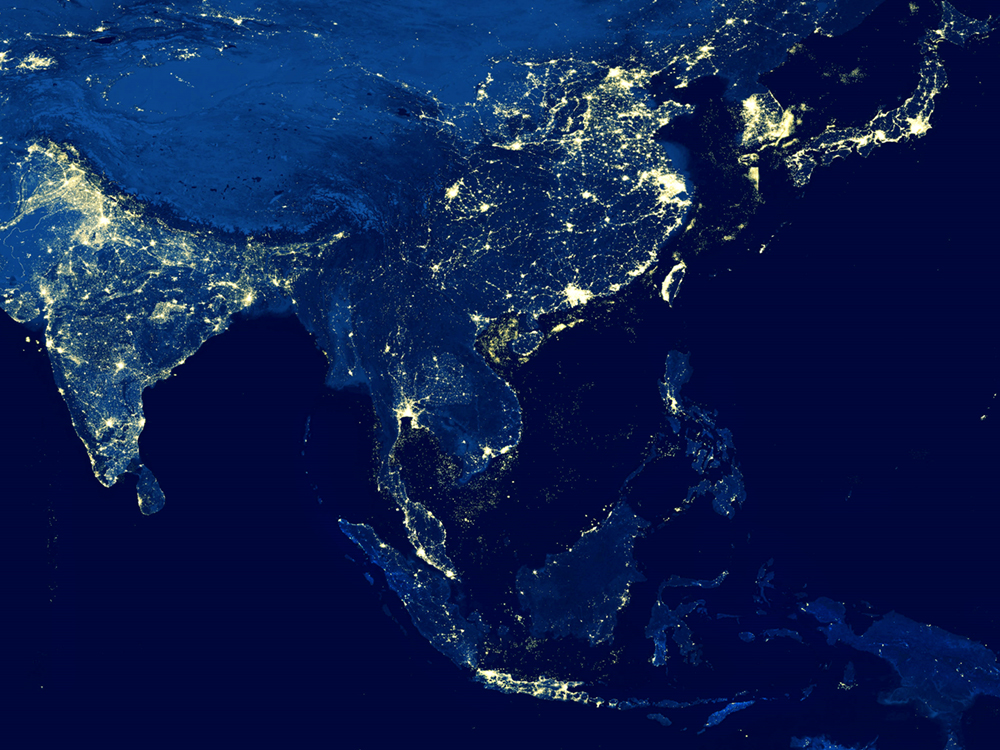
Canada, Southeast Asia, and the Indo-Pacific Strategy: Engaging a Critical Region
3 March 2023
The Indo-Pacific—as the region around the two oceans is now increasingly known—has become a critical node in regional security and geopolitics. Released in November 2022, Canada’s new Indo-Pacific Strategy, Canada’s first foreign policy white paper in 19 years, notes the “rising influence of the Indo-Pacific region is a once-in-a-generation global shift that requires a generational Canadian response.” It sets out five priorities: (1) promote peace, resilience and security; (2) expand trade, investment and supply chain resilience; (3) invest in and connect people; (4) build a sustainable and green future; and (5) Canada as an active and engaged partner to the Indo-Pacific. This one-day conference consisted of three roundtable panels focussing on the implications of the Indo-Pacific Strategy for Southeast Asia. The first panel, Canada’s Indo-Pacific Strategy and Southeast Asia, provided an overview of those implications for Canada’s relationship with the region. The second panel focused on climate, sustainability, and trade. The third panel zoomed in on the security Implications for Canada and Southeast Asia and the wider region.
In the spirit of this roundtable series, this conference brought together thought leaders from the academy, government, industry, and civil society organizations—from Canada and Southeast Asia—to explore the implications of the strategy.
___________
CAPI gratefully acknowledges the support of Canada's Department of National Defence through its Targeted Engagement Grant Fund

With additional support from
![]()
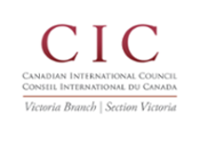
Panels and Panellists
Panels and Panellists
Opening Remarks
- Keynote: Daniel Holton, Global Affairs Canada
- Kevin Hall, President, UVic
Panel 1: Canada's Indo-Pacific Strategy and Southeast Asia
- Jay. L. Batongbacal, College of Law, University of the Philippines, Manila, Philippines
- Kasira Cheeppensook, Political Science, Chulalongkorn University, Bangkok, Thailand
- Socheata Sao, Royal University of Law and Economics, Phnom Penh
- Hugh Stephens, CAPI Associate and Associate Faculty, Royal Roads University, Victoria, Canada
Co-Moderators: Helen Lansdowne and Victor V. Ramraj
Panel 2: Climate, Sustainability & Trade
- Charika Channuntapipat, TDRI, Bangkok, Thailand
- Patricia Fuller, Senior Fellow, University of Ottawa, and former Ambassador for Climate Change
- Basma Majerbi, Gustavson School of Business, University of Victoria, Canada
- Stephen Wortley, Partner, McMillan LLP, Vancouver & Chair, Hong Kong Office
Co-moderators: Helen Lansdowne & Carol Liao
Panel 3: Security Implications for Canada and Southeast Asia
- Kasira Cheeppensook, Political Science, Chulalongkorn University, Bangkok, Thailand
- Bruce Donaldson, Vice-Admiral CMM, CD (retired), former Deputy CDS, Victoria, Canada
- Swaran Singh, Visiting Professor, UBC & Professor of International Studies, JNU, New Delhi
- Major-General Gregory Smith, Director General, International Security Policy, Ottawa, Canada
Co-moderators: Reeta Tremblay and Yves Tiberghien
Closing Remarks:
- Jeff Nankivell, CEO, Asia-Pacific Foundation of Canada, Vancouver
Summary of the discussion
Canada, Southeast Asia, and the Indo-Pacific Strategy:
Engaging a Critical Region
15th CAPI Roundtable on Southeast Asia in Global Context
Friday, 3 March 2023 | University of Victoria
Summary of the Discussion
by Ngozi S. Nwoko, PhD Candidate, Faculty of Law, University of Victoria
This roundtable was convened on 3 March 2023 by the Centre for Asia-Pacific Initiatives (CAPI) as the 15th instalment of its Roundtable series, Southeast Asia in Global Context. CAPI’s Acting Director, Professor Pooja Parmar, welcomed the participants, acknowledging the lək̓ʷəŋən peoples and the Songhees, Esquimalt and W̱SÁNEĆ peoples on whose traditional territory the conference took place. CAPI Law Chair Victor V. Ramraj then offered some welcoming and framing remarks (also on behalf of co-convener, CAPI Senior Research Fellow Phil Calvert). He noted, as the Director (currently on leave) of CAPI, an interdisciplinary Asia-focussed centre, how pleased he was that Canada was once again engaging the Indo-Pacific region. He then explained that although he served as an advisor on the Indo-Pacific Advisory Committee, he did not feel he had an authorship stake and welcomed a robust, critical engagement with the Strategy in the spirit of debate and constructive feedback, confident that the funders shared these values as well. He then invoked a modified version of the Chatham House Rule, explaining that the participants could use the information obtained, but without attributing any specific point or comment to a specific speaker or their institutional affiliation.
Professor Ramraj then introduced UVic President Kevin Hall, who spoke to the University’s engagements with Asia, and the keynote speaker, Daniel Holton, from Global Affairs Canada, who offered some framing remarks on Canada’s Indo-Pacific Strategy. He presented the strategy as a comprehensive and well-funded signal of Canada’s commitment to being a full-spectrum stakeholder and reliable partner to the region. He underscored Canada’s strong support for ASEAN centrality, highlighting a range of new initiatives focused on Southeast Asia, and stressed that Canada is not asking regional partners to choose between the region’s major powers. Finally, he thanked CAPI for its exceptional work fostering research and policy debate related to this critical region. The conference then proceeded with three roundtable panels, the discussion of which, in the spirit of the modified Chatham House Rule, is summarized here without attribution of specific points to individual speakers.
Panel 1: Canada's Indo-Pacific Strategy and Southeast Asia
The first panel began with a high-level discussion of the Indo-Pacific Strategy (IPS). The panel began with a question about Canada’s visibility in Southeast Asia. One panelist started by noting that “Canada is back” and was again using its convening power in the region. The panelists spent some time considering whether the country was mainly pursuing its own or broader interests through the IPS. The panel then considered the co-moderators’ questions about possible gaps in the IPS, whether the IPS was a constraint on China’s influence in Southeast Asia, and whether it pushed countries in the region into making difficult foreign policies choices.
Some members of the panel traced Canada’s lack of visibility in Southeast Asia to the late 2000s when the Canadian government directed its attention to Europe, the Caribbean, and South America, respectively. In contrast, the presence of the United States has been more constant. Some panelists thought that there were opportunities for Canada to engage more economically and to contribute positively in relation to the experiences of Indigenous peoples and on health issues in the region. Nonetheless, the panel acknowledged that Canada is known for welcoming asylum seekers, for its peacekeeping activities in Southeast Asia, and for advocating on landmine issues in the region.
It was noted that IPS will be focussed on advancing Canada’s interests, while at the same time, seeking complementarity of interests in all areas including free trade, human rights, security, and support for dialogue in times of conflict, among other areas. The implementation of some elements of the IPS (e.g., human rights) in some countries in Southeast Asia may at times conflict with Canadian interests and values. One panelist suggested that there should be a coherent mechanism for implementing the IPS. Another panelist noted that Indigenous communities and workers in the textile and extractive industries in some Southeast Asian states have become victims of human rights violations committed by Canadian and other foreign companies.
In considering possible gaps in the IPS, panel members noted that there is a lack of detailed information on how the programs in the IPS would be implemented. For example, at the time of this roundtable, there was still no special envoy to coordinate the Canadian government activities across the Indo-Pacific region. The role of the trade representative for the IPS was also not clearly specified. There was also a lack of clarity on who will oversee the regional engagement initiative of the IPS. The IPS’s capacity uplift would require the involvement of trained and experienced facilitators. One panelist suggested that there should be an annual report on how the IPS programs are implemented and to create room for measurable outcomes. One panel member noted that the IPS was silent on the Quadrilateral Security Dialogue (Quad) and the AUKUS security pact; an enhanced naval presence in Southeast Asia and human rights were considered important priorities.
Some panel members suggested that another “Western” Indo-Pacific strategy might be received by countries in Southeast Asia with some discomfort. Some governments might be receptive to China’s economic and investment overtures precisely because Beijing does not attach human rights conditions to its economic aid. Other governments might agree to work with Canada if it presents a reliable alternative to what China has to offer. Despite key ideological differences with some governments in the region, there are opportunities for Canada to engage and cooperate with China and with countries in Southeast Asia on climate change, maritime security, and green technology. While engaging China, Canada should continue to recognize the risks posed by such engagement, making its areas of disagreement clearly known, while pursuing areas of common interest with Beijing.
Panel 2: Climate, Sustainability & Trade
The second panel began by considering the concepts of trade and sustainability as used in the same context and whether trade policy can be used to save the planet. It highlighted some sustainability challenges facing Southeast Asia such as biodiversity, deforestation, water scarcity, rising sea level in small island states, and huge infrastructure projects with their consequential displacement of communities and land disputes. It identified a tension between trade and sustainability in the Indo-Pacific Strategy, noting that trading activities between Canada and the Indo-Pacific region will lead to increased emissions, particularly in the shipping, aviation, and extractive activities. The panel suggested that the tension could be resolved through effective policies and regulation. It acknowledged, however, some positive indicators of sustainability in the IPS document such as regulation of illegal fishing, and increased capacity for FinDev to expand its green infrastructure in SEA. The panel observed that most of the trading activities in the IPS were focused on the export of Canadian goods to Southeast Asia; it noted further that for the IPS to work, there must be win-win trade, investment, and sustainability collaborations and outcomes for Canada and Southeast Asian countries. Trade and investment can help facilitate sustainability. Canadian businesses and investors from South Korea and China have begun to work together on the production of hydrogen to power vehicles, the export of small nuclear reactors from South Korea to Alberta to tackle energy consumption, and lithium mining for electric vehicle batteries.
The panel also considered China’s domination of the processing of critical minerals in Southeast Asia, and the need for Canada to work within the region on the diversification of the supply chains that are largely controlled by China. It observed that critical minerals are central to Canada’s energy systems and that a clean energy future is an opportunity for every country to be more energy independent. One panelist expressed a concern that China has the potential to weaponize energy dependency to the detriment of others. Another suggested that Canada needs to accept investors from diverse political and legal systems and ideologies; such an approach would be beneficial to its socio-economic and technological development. One panel member noted that despite any security threat that China might pose, an adversarial posture toward Beijing would be counterproductive. Canada, it was urged by one panel member, needs to forge military, educational research, and economic partnerships with China that will lead to renewed and increased engagement, eventually reducing conflicts between the two countries. Another panelist disagreed, positing that Canada should engage with investors from like-minded countries instead. It was also observed that Canadian values and standards should be applied equally in the Indo-Pacific and not selectively to make China seem like the only country in the region that engages in human rights violations. It is hypocritical when the poor human rights records of other key Canadian partners mentioned in the IPS are hardly mentioned.
One panel member observed that although the IPS contains many of green initiatives, it is silent on the clean energy transition from fossil fuels and how Canada and Southeast Asia will forge just energy transition partnerships with international financial institutions. It was suggested that the omission might be due to Canada’s planned export of liquefied natural gas to Asia in 2025. The panel noted that the IPS budget for green projects is inadequate, and that Canada should showcase its leadership in green technology in Southeast Asia.
Panel 3: Security Implications for Canada and Southeast Asia
The panel members began by asking whether the IPS was mainly about containing China and how to strengthen the security initiatives in the strategy document. Some panel members thought that the IPS goes beyond normatively containing China, clearly expressing Canada’s approach to dealing with China and other countries in Southeast Asia and informing the world about Canada’s position in difficult bilateral and multilateral relations. It was noted that the IPS also addresses how Canada could manage other emerging threats in the Indo-Pacific, bringing its own expertise and drawing on the experience of Southeast Asia in areas of climate change and illegal migration. However, it was also suggested that Canada should maintain its status in international relations as a peacekeeper, particularly in light of the high cost of global military spending. However, since China is a major focus in the IPS, Canada might be perceived as less neutral, sharing a similar view as the UK and the European Union.
In discussing whether the IPS was focused on containing China, the panel highlighted some areas in which Canada is forging military relationships with Southeast Asia—for example, by engaging in capacity building. It was noted that Canada is putting three frigates in the Indo-Pacific and will be conducting military exercises and exchanging military expertise with countries in the region. Ottawa will share its expertise on cyber defence and women, peace, and security in the Indo-Pacific. Canadian embassies and high commissions in the region will be staffed with experienced policy officers to help coordinate the security initiatives of the IPS. Some panelists reiterated that Canada stands ready to clearly communicate and reinforce its national interest in the Indo-Pacific and contribute to the rules-based order. For some members of the panel, there was a demand for a robust Canadian security presence in the Indo-Pacific and that Canada needs to constantly engage with other regions.
The panel outlined thematic issues that were either missing from the IPS or could be expanded or enhanced, such as anti-piracy operations, access to water, funding for feminist international assistance and women’s participation in peace processes, initiatives to address the underlying causes of gender violence in the Asia-Pacific, humanitarian assistance and disaster response operations, security engagement with India, and some potential flashpoints of the region such as Bangladesh and Sri Lanka. Furthermore, it was suggested that there should be a performance management framework that will be overseen by the Canadian Parliament to evaluate how Ottawa is delivering on the commitments set out in the IPS.
Some members of the panel thought that for Canada to be successful in implementing the IPS, it need to be embedded in Canadian foreign policy, and Canada needs to constantly engage with other regions, while protecting areas of sovereign national interest. Panelists noted that there is no desire for Canada to mirror the defence structure of the North Atlantic Treaty Organization in the Indo-Pacific. Canada should add value through exchange of knowledge with Southeast Asian countries in areas of rule of law, health, and disaster relief operations, among others.
A Summary of the Closing Session
The closing session featured Jeff Nankivell, CEO of the Asia-Pacific Foundation of Canada, who highlighted the points that stood out for him in the panel discussions and raised additional observations and concerns about the Indo-Pacific Strategy (IPS). Following his remarks, Professor Ramraj thanked him and closed the conference with a further vote of thanks to the funders, organizers, panelists, and online guests for their contributions to the success of the conference.
XIV. Economy, Climate, Security in the Shadow of Covid-19 [March 2022]
Economy, Climate, Security in the Shadow of Covid-19
31 March 2022
The 14th instalment of CAPI’s ongoing Southeast Asia in Global Context roundtable series featured a distinguished panel of international experts on the challenges and decisions facing Southeast Asian countries as they emerge from the latest waves of the Covid-19 pandemic and adjust to the new regional and global landscape.
Participants considered how health and environmental priorities have affected trade and investment flows in the region, with particular attention to the pandemic’s potential long-term impact on Southeast Asia’s economy, trade patterns, and budget priorities, in the context of the Indo-Pacific region. If countries are prioritising economic growth, what will the impact be on the use of fossil fuels and green energy plans, and what are the implications for climate change commitments? How will rising public expenses relating to healthcare and social welfare be addressed and prioritised? The participants also explored the traditional security issues in the Indo-Pacific and the power dynamics in different parts of Southeast Asia.
CAPI gratefully acknowledges the support of Canada's Department of National Defence through its Targeted Engagement Grant Fund (Grant title: Canada, Southeast Asia, and the Indo-Pacific: Engaging a Critical Region) and the session was held under a modified version of the Chatham House Rule, such that views and comments of individual participants were not to be attributed.

Participants
Panellists:
- Lorraine Elliott, Professor Emerita, International Relations, Australian National University
- Mina Hoofar, Professor and Dean of Engineering, University of Victoria, Canada
- Erik Kuhonta, Associate Professor, Political Science, and Director, Institute for the Study of International Development, McGill University, Canada
- Pavida Pananond, Professor, International Business, Thammasat Business School, Thammasat University, Bangkok
- Sharon Seah Li-Lian, ISEAS Yusof–Ishak Institute, Singapore
Concluding remarks:
- Peter Lundy, Director General, Southeast Asia, ASEAN, APEC, Global Affairs Canada
Chairs:
- Phil Calvert, CAPI Senior Research Fellow and former Canadian Ambassador to Thailand, Cambodia, and Laos
- Victor V. Ramraj, CAPI Director and Chair in Asia-Pacific Legal Relations and Professor of Law, University of Victoria
Reflection on the discussion
| By Dulma Karunarathna, visiting CAPI Post-Doctoral Research Fellow, and Panch Rishi Dev Sharma, UVic Law PhD student
The 14th instalment of CAPI’s Roundtable Series on Southeast Asia in Global Context brought together a distinguished panel of academics, researchers, and diplomats on Economy, Climate and Security in the Shadow of Covid-19 in the region. The roundtable’s interdisciplinary discussion focused on the coexistence of energy justice and environmental security with post-pandemic priorities for the region on economy, trade, and global supply chains. The roundtable also addressed issues of national security, political economy and regional politics in the wider framework of geopolitics and current international developments.
Participants were invited to consider three sets of interdependent questions: (1) As countries in Southeast Asia are emerging from Covid-19, how have health and environmental priorities affected trade and investment flows in the region? (2) If countries are prioritizing economic growth, what will be the impact on the use of fossil fuels and green energy plans, and what are the implications for climate commitments (and rising healthcare costs)? (3) How have competing public priorities affected — or destabilized — institutions, domestic or international?
The first part of the discussion focused on the effects of the Covid-19 pandemic on larger issues of environmental, economic, and social policy-making by bringing a human dimension to existing vulnerabilities in ASEAN. One participant stressed that investment is not value-neutral and also not simply a transactional modality, so questions of energy policy need to be linked to climate change and sustainability. Another participant identified three dimensions of economic recovery in the region: moderating globalization with a reduced reliance on global trade and investment by concentrating on resilient regional supply chains; prioritizing health and environmental concerns of economic recovery within the prism of green growth; and taking precautionary economic efforts in the context of the Russia-Ukraine war and other security risks that disrupt global supply chains.
Many Southeast Asian countries, panelists observed, were not planning a green recovery because of the absence of a collective climate change strategy and because of the massive dependency on global energy supply chains. Southeast Asian states have shown some isolated positive efforts, such as retiring aging coal-fired power plants, but ASEAN governments need to collaborate more effectively on regional energy connectivity, and on a regional regulatory framework to realize its climate goals. The panel stressed the importance of diversifying short-term technological strategies such as blending natural gas with hydrogen and long-term technological strategies such as solar, wind, and tidal energy. The competition to develop semiconductors and lithium batteries as the short-term strategies has also caused environmental concerns, including mining of rare earth materials, so states should rationally prioritize short-term and long-term technological strategies for a green energy transition.
One panelist highlighted regime change in Southeast Asia as a political consequence of the pandemic, focusing on autocratic regimes in the Philippines, Cambodia, and Myanmar. The panel also discussed how the pandemic presented an opportunity for governments to use extraordinary emergency powers such as the Anti-terrorism Law in Philippines in 2020, and the Emergency Law and Precautionary Law for Covid-19, along with detentions and curtailing of civil liberties in Cambodia. The roundtable concluded with general reflections Canadian foreign policy in the region.
Photo
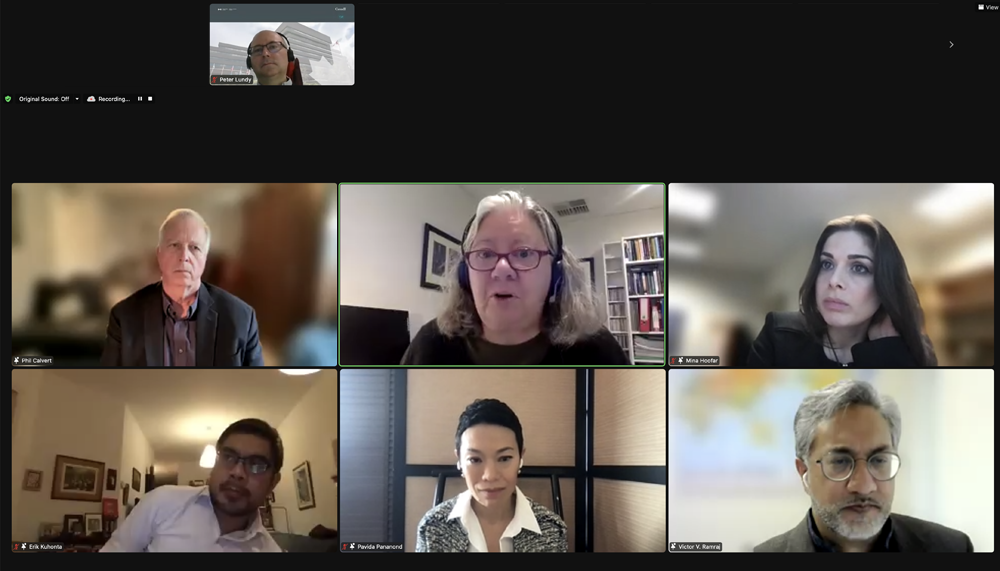
XIII. AUKUS, Southeast Asia, and the Indo-Pacific: Realignment, Conflict, or Cooperation? [November 2021]
AUKUS, Southeast Asia, and the Indo-Pacific: Realignment, Conflict, or Cooperation?
18 November 2021
The 13th instalment of CAPI’s ongoing Southeast Asia in Global Context roundtable series featured a distinguished panel of international experts examining the implications of the new AUKUS (Australia-United Kingdom-United States) alliance for traditional and non-traditional security issues. Participants considered how the emerging geopolitical realignment complicates the ability of countries in the region and great powers to cooperate on ongoing global challenges such as Covid-19 recovery and the climate crisis. The session sought to raise awareness of Southeast Asia generally as a critical node in the Indo-Pacific region, one deserving of close attention in understanding the balance of geopolitical power and and the consequences of rising tensions for human security, ethical economic development, and environmental protection. This particular roundtable was featured as part of the University of Victoria's Global Days 2021 a new series of events focused on global issues relating to sustainability.
CAPI gratefully acknowledges the support of Canada's Department of National Defence through its Targeted Engagement Grant Fund and the session was held under the Chatham House Rule

Participants
Panellists:
- John Blaxland, Professor of International Security, and Intelligence Studies and former Head of the Strategic and Defence Studies Center, Australian National University
- Mely Caballero-Anthony, Professor of International Relations and Head of the Centre for Non-Traditional Security Studies; President’s Chair in International Relations and Security Studies, Nanyang Technological University, Singapore
- Joanna Chiu, Vancouver-based senior journalist covering both Canada-China relations and current affairs on the West Coast for the Toronto Star; author of China Unbound: A New World Disorder
- Kai Ostwald, Associate Professor, School of Public Policy & Global Affairs and the Department of Political Science; Director, Institute of Asian Research, University of British Columbia
Chairs
- Phil Calvert, CAPI Senior Research Fellow and former Canadian Ambassador to Thailand, Cambodia, and Laos
- Victor V. Ramraj, CAPI Director and Chair in Asia-Pacific Legal Relations and Professor of Law, University of Victoria
Reflection on the discussion
| By Dulma Karunarathna, visiting CAPI Post-Doctoral Research Fellow
This roundtable session convened another distinguished panel of national and international experts to discuss the implications of the new AUKUS alliance, consisting of Australia, the United Kingdom, and the United States. This new alliance potentially raises the stakes for conflict and recalibrates the prospects for cooperation on other pressing global issues. This roundtable examined how the evolving geopolitical realignment complicates the ability of countries in the Southeast Asian region and great powers to cooperate on ongoing global challenges such as the Covid-19 pandemic and the climate crisis. The session sought to raise awareness of Southeast Asia as a critical node in the Indo-Pacific region, one deserving of close attention in understanding the balance of geopolitical power, and its important role in striving for greater human security, ethical economic development, and environmental protection.
The discussion was framed around three sets of questions: (1) What are the implications of AUKUS for security and trade alliances in the region, especially the Quad, the Five Eyes, and the CPTPP? What are the implications more generally for geopolitics and the trade agenda? (2) What are the implications of the new alliance for Southeast Asia and ASEAN? What are the implications for Canada’s engagement with that region? (3) How does the new alliance affect the prospects for international cooperation on the Covid-19 pandemic and climate action?
The panel began with a discussion of the implications of AUKUS for Canada, Southeast Asia, and global politics generally. One panelist suggested that AUKUS was not necessarily a new alliance for Australia but a technical agreement to share nuclear propulsion technology and to assist Australia in bolstering instability; it strengthens many elements of existing agreements and arrangements for sharing advanced technologies, the development of nuclear submarines for Australia. But beyond this “technical” perspective, the geopolitical tensions and narratives around AUKUS reflected existing traditional and non-traditional security challenges for Southeast Asia, such as the strategic autonomy of many countries within ASEAN. Other challenges highlighted by the panelists included growing tensions between major powers, possible marginalization by great power contestation, the relative hierarchy among the members of the AUKUS alliance, and the risk of misperception or miscalculation of threats. Panelists also noted the importance of acknowledging the vast diversity of views in Southeast Asia and ASEAN, between and within its member countries.
The implications of AUKUS for great power contestation of the Indo-Pacific was a recurring theme in the discussion. One panelist drew the attention to the symbolism behind the term “Indo-Pacific” instead of “Asia-Pacific,” which is seem by some as an attempt to challenge China’s influence in the region and strengthen India’s position. On Canada’s role of Canada in Southeast Asia, Canada's exclusion from the AUKUS alliance was considered. Some panelists noted that Canada’s soft power in the region and its influence shaping multilateralism in the region, was highly appreciated and would be welcome. A final theme that emerged from the discussion was the importance of separating and “cabining” geopolitical security issues from other issues such as the climate crisis and the Covid-19 pandemic, to allow for collaboration on these issues in the region. However, the panelists also stressed the importance of working together under a proper crisis management plan to preventing miscalculation.
Photo gallery
XII. Water Governance in Southeast Asia: A Roundtable Discussion on the Mekong River Basin [March 2021]
Water Governance in Southeast Asia: A Roundtable Discussion on the Mekong River Basin
18 March 2021
Participants
Opening remarks:
- Kevin Hall, President, University of Victoria
Panellists:
- Pianporn Deetes, Regional Campaigns and Communications Director, Southeast Asia Program, International Rivers
- Brian Eyler, Senior Fellow and Director, Southeast Asia program, Stimson Centre, Washington DC
- Melissa Marschke, Associate Professor, International Development and Global Studies, University of Ottawa, Canada
- Carl Middleton, Director of the Center for Social Development Studies, Faculty of Political Science, Chulalongkorn University, Thailand
Chairs:
- Phil Calvert, CAPI Senior Research Fellow and former Canadian Ambassador to Thailand, Cambodia, and Laos
- Victor V. Ramraj, CAPI Director and Chair in Asia-Pacific Legal Relations and Professor of Law, University of Victoria
XI. US Election Debrief: Implications for Southeast Asia [November 2020]
US Election Debrief: Implications for Southeast Asia
19 November 2020
Participants
Panellists:
- Nirmal Ghosh, US Bureau Chief, The Straits Times
- Ratana Ly, PhD candidate, UVic Law; Researcher, Center for the Study of Humanitarian Law, Cambodia
- Kai Ostwald, Assistant Professor, UBC Political Science and School of Public Policy & Global Affairs; Director, UBC’s Centre for Southeast Asia Research
- Thitinan Pongsudhirak, Executive Director & Professor, Institute of Strategic and International Studies, Chulalongkorn University, Thailand
- Bridget Welsh, Honorary Research Associate, University of Nottingham Asia Research Institute Malaysia; Senior Research Associate, Hu Feng Center for East Asia Democratic Studies, National Taiwan University; Senior Associate Fellow, The Habibie Center
Chairs:
- Phil Calvert, CAPI Senior Research Fellow and former Canadian Ambassador to Thailand, Cambodia, and Laos
- Victor V. Ramraj, CAPI Director and Chair in Asia-Pacific Legal Relations and Professor of Law, University of Victoria
X. Justice for the Rohingya: The Role of Canada [May 2020]
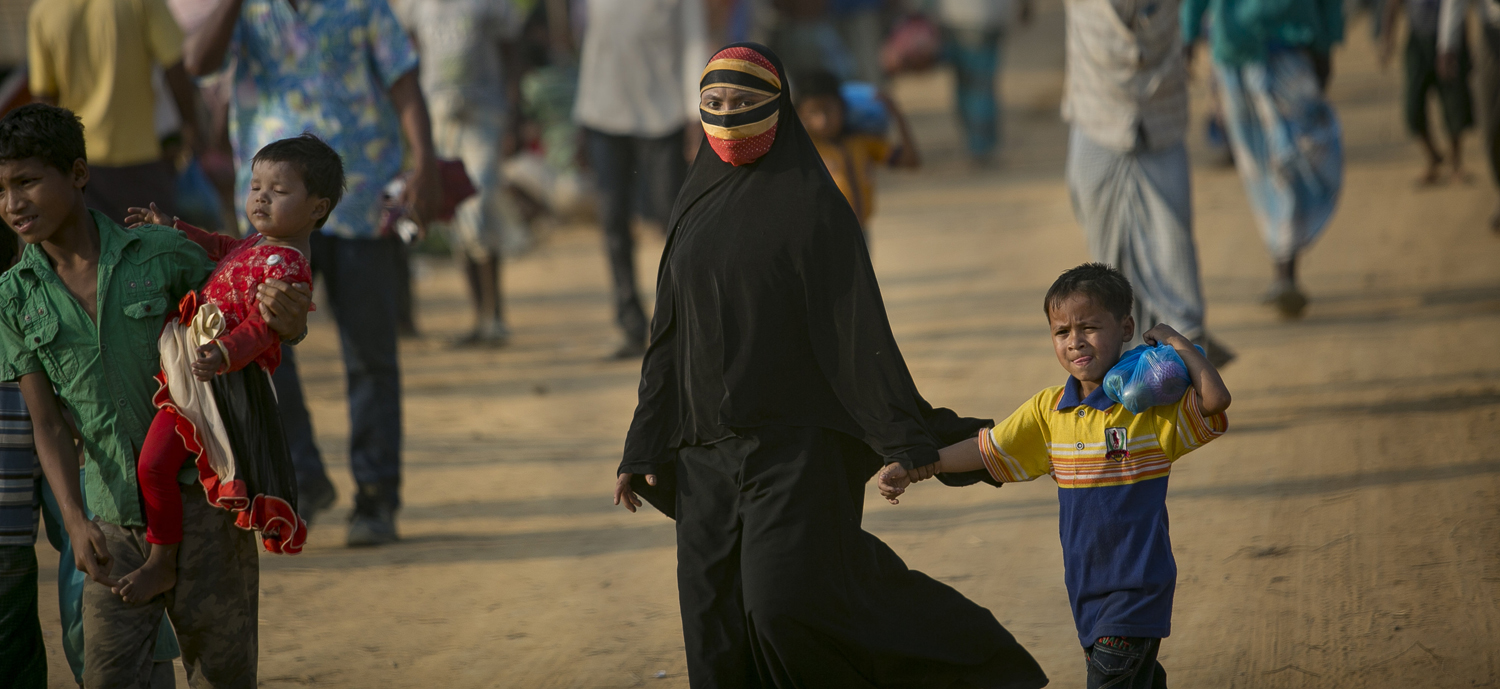
Photo: UN Women/Allison Joyce / Flickr
Justice for the Rohingya: The Role of Canada
21 May 2020
In a special international virtual roundtable of experts, CAPI, in collaboration with UVic Law, Canadian Senator Marilou McPhedran, and the Human Rights Research and Education Centre at the University of Ottawa convened about 75 invited experts from Canada, the United States, the United Kingdom, Bangladesh, South Korea, and Australia, to consider the role of Canada in seeking justice for the Rohingya.
Featured speakers:
- Honourable Marilou McPhedran, Independent Senator, Parliament of Canada;
- Her Excellency Jacqueline O’Neill, Ambassador for Women, Peace, and Security, Canada;
- Honourable Bob Rae, Special Envoy on Humanitarian and Refugee Issues, appointed by the Prime Minister of Canada;
- Prof. Payam Akhavan, Member of the Permanent Court of Arbitration, The Hague; Faculty of Law, McGill University; Counsel for The Gambia at the ICJ in the case of The Gambia v. Myanmar;
- Prof. Yanghee Lee, United Nations (UN) Special Rapporteur on the situation of human rights in Myanmar (May 2014 to 30 April 2020);
- Prof. Susan Breau, Dean, Faculty of Law, University of Victoria, Canada;
- Prof. Christine Chinkin, Emerita Professor of International Law, London School of Economics, UK;
- Prof. Victor V. Ramraj, Faculty of Law and Director, Centre for Asia Pacific Initiatives, University of Victoria, Canada;
- Prof. John Packer, Associate Professor of Law, Director of the Human Rights Research and Education Centre (HRREC) & Neuberger-Jesin Professor of International Conflict Resolution, University of Ottawa, Canada;
- Ms. Razia Sultana, Chairperson, Rohingya Women’s Welfare Society, Cox’s Bazar, Bangladesh;
- Ms. Wai Wai Nu, Rohingya/Burmese founder, Women’s Peace Network, Yangon, Myanmar;
- Ms. Akila Radhakrishnan, President, Global Justice Center, New York, USA;
- Ms. Mavic Cabrera Balleza, Founder and Chief Executive Officer, Global Network of Women Peacebuilders, New York, USA.
Read the summary report
IX. Southeast Asia: Recent Trends and Perspectives [November 2019]

Southeast Asia: Recent Trends and Perspectives
29 November 2019 at the University of Ottawa
CAPI was pleased to collaborate with The Asian Studies Network at uOttawa’s Centre for International Policy Studies (CIPS/CÉPI) to present a special roundtable discussion on Southeast Asia in Global Context in the nation's capital. In this session, our expert panel examined three broad regional themes: (1) Ethno-Religious Nationalism; (2) Livelihoods, Precarious Labour & Climate Refugees; and (3) Investment, Human Rights, and Security.
CAPI gratefully acknowledges the support of the Department of National Defence Canada Defence Engagement Program

Participants
- Susan Gregson, Senior Fellow, Graduate School of Public and International Affairs, UOttawa, and former ADM Asia-Pacific with Global Affairs Canada
- Helen Lansdowne, CAPI Associate Director
- Melissa Marschke, Associate Professor, International Development and Global Studies, UOttawa
- Kai Ostwald, Director, Centre for Southeast Asia Research, and Assistant Professor, Department of Political Science and the School of Public Policy & Global Affairs, UBC
- Phil Calvert, CAPI Senior Research Fellow and former Canadian Ambassador to Thailand, Cambodia, and Laos
- Victor V. Ramraj, CAPI Director and Chair in Asia-Pacific Legal Relations and Professor of Law, University of Victoria
Photo gallery
VIII. Financial Innovation, Systemic Risk and Climate Crisis in Asia [October 2019]
Financial Innovation, Systemic Risk & Climate Crisis in Asia
17 October 2019
In this, the 8th instalment of CAPI’s ongoing “Southeast Asia in Global Context” roundtable discussion series, we convened an interdisciplinary panel of international experts to examine issues in green finance as well as financial regulation/systemic risk, especially as they relate to climate issues and political instability in the region and beyond (e.g., Hong Kong, Brexit).
The discussants considered whether countries such as Hong Kong and Singapore (and Canada) can take credit for their relatively mild experience of the 2008 global financial crisis, and whether there would have been a global financial crisis if Islamic banking principles had been in operation. Finally, the panel considered how financial institutions are adjusting to the climate crisis.
Participants
Panellists:
- Meyer Aaron, CEO, 3Pi Capital Advisory Inc; former Policy Advisor,Bank of Canada
- Ravipal Bains,Associate, McMillan LLP, Vancouver
- Adhiti Gupta,Manager, Design Funding, Convergence Blended Finance, Toronto
- Christian Hofmann,Assistant Professor, Faculty of Law, National University of Singapore (via video-link)
- Daromir Rudnyckyj,Associate Professor, Anthropology, University of Victoria
Chairs
- Phil Calvert, CAPI Senior Research Fellow and former Canadian Ambassador to Thailand, Cambodia, and Laos
- Victor V. Ramraj, CAPI Director and Chair in Asia-Pacific Legal Relations and Professor of Law, University of Victoria
Photo gallery
VII. The South China Sea: What is Now and What is Next? [March 2019]
The South China Sea: What is Now and What is Next?
21 March 2019
The 7th in CAPI’s ongoing Southeast Asia in Global Context roundtable series convened another distinguished panel of international experts to discuss the simmering issues in the highly contentious South China Sea region.
Discussion topics included:
- Overview/Background. What is the current geopolitical status of and tensions in the South China Sea? In particular, how have the tensions in the region affected ASEAN and intra-Southeast Asia relations?
- US-China Relations. What is the status of the Freedom of Navigation Operations in the region? To what extent is the US-China relationship influenced by the geopolitics of the South China Sea? How close have we been and are we to a military conflict in the region?
- International Law & Institutions. What are the important legal developments since the 2016 decision of the Permanent Court of Arbitration? What role can international law and formal international institutions play in responding to developments in the region?
CAPI gratefully acknowledges the support of the Department of National Defence Canada Defence Engagement Program

Participants
Panellists:
- Nirmal Ghosh, US Bureau Chief, The Straits Times, Washington DC, USA
- Nong Hong, Executive Director & Senior Fellow, Institute for China-America Studies, Washington DC, USA
- Ted L McDorman, Professor, Faculty of Law, University of Victoria, Canada
- Giles Norman, Executive Director, Defence and Security Policy, Global Affairs Canada
- Thitinan Pongsudhirak, Executive Director & Professor, Institute of Strategic and International Studies, Chulalongkorn University, Bangkok, Thailand (via video-link)
- Jeff Reeves, Vice-President, Research, Asia Pacific Foundation, Vancouver, Canada
- Brett Witthoeft, Royal Canadian Navy Indo-Pacific Security Analyst, Maritime Forces Pacific, Victoria, Canada
Chairs
- Phil Calvert, CAPI Senior Research Fellow and former Canadian Ambassador to Thailand, Cambodia, and Laos
- Victor V. Ramraj, CAPI Director and Chair in Asia-Pacific Legal Relations and Professor of Law, University of Victoria
Reflection on the discussion
“A Fine Dance”: A Reflection on The South China Sea, What is Now and What is Next?
| By Frances Ankenman, J.D. Candidate, UVic Faculty of Law
In the latest roundtable event of the Southeast Asia in Global Context series, CAPI welcomed interdisciplinary experts from both Asian and North American institutions to explore contemporary trends in the Pacific Ocean’s most pressing maritime and territorial dispute: the South China Sea. As one of the world’s most biologically, economically and strategically significant marine environments, the South China Sea is a geopolitical hotspot with implications for security, trade, and balances of power at a global scale.
As a centuries-old conflict engaging nations both within and far beyond the region, the ongoing international dispute mirrors the South China Sea itself: old and deep, whose currents flow to the rest of the world. Discussion centered on the evolving relationships among claimants and key strategic players, with a particular focus on the relationships between the United States, China and the Association of Southeast Asian Nations (ASEAN). Panelists agreed the dispute has reached a fragile equilibrium between China and US superpowers, with the US continuing to conduct uninterrupted Freedom of Navigation Operations (FONOPS) patrols and China asserting sovereignty through a strong military presence and surveillance of maritime activity in the region.
While there have been relatively few state-driven conflicts in the region in recent years, panelists agreed that close proximity situations in the South China Sea, whether between military or non-military vessels, could easily escalate. Some expressed low confidence in the region’s ability to de-escalate a complex conflict with existing tools, owing to growth in domestic pressures in claimant countries, densification of military presence, sophistication of weapons, and progressively rapid cycles of action and reaction. Nationalism and jingoism in claimant states could also flare in the face of an international conflict and complicate de-escalation efforts, though governments in China and Southeast Asia have generally limited nationalist movements to the extent that they threaten economic relations with other states.
Panelists debated whether US involvement in the South China Sea has shifted under Trump administration, with a general consensus that it is louder and lacking in strategic focus compared to engagement under Obama administration. ASEAN states broadly find themselves caught between superpowers and have chosen, in the words of one panelist, to ‘swim in the middle’. There will likely be more pressure on ASEAN states moving forward to align their security and economic interests with one of the superpowers, which may fracture the association as a whole.
Next, panelists examined the role of public international law a tool to promote international cooperation and manage conflict in the South China Sea. Panelists pointed to the Permanent Court of Arbitration decision, which was rejected by China, as an example of the limited effectiveness of non-binding international law. The Code of Conduct (COC), under negotiation, is seen as a significant opportunity to create a binding, long-lasting agreement among nations in the region. Importantly, from China’s perspective a COC could support peripheral stability, one of its long-term primary strategic goals.
In South China Sea: What is Now, What is Next?, panelists dove deep into the murky waters of the South China Sea dispute to critically examine the large-scale strategic adjustments driving complex, multifaceted and interwoven relationships among the world’s most powerful nations. Gathering experts with diverse perspectives and experiences, this event produced a vibrant and stimulating dialogue on the latest chapter – and those yet to be written - of the story of the South China Sea.
Photo gallery
VI. Ethno-Religious Nationalism and Authoritarianism in Southeast Asia [October 2018]
Ethno-Religious Nationalism and Authoritarianism in Southeast Asia
25 October 2018
What are the major flashpoints and key indicators for authoritarianism in Southeast Asia and what are the underlying societal conditions that have given rise to the political shifts we are witnessing in the region?
In the latest of our ongoing “Southeast Asia in Global Context” roundtable series, a distinguished panel of international experts will consider questions about trends in human rights, democracy, and enthno-religious nationalism in Southeast Asia.
CAPI gratefully acknowledges the support of the Department of National Defence Canada Defence Engagement Program

Participants
Panellists
- Vitit Muntarbhorn, Faculty of Law, Chulalongkorn University, Thailand, and UN Independent Expert on violence and discrimination based on sexual orientation and gender identity
- Phil Robertson, Deputy Director, Asia Division, Human Rights Watch
- Shane Barter, Director of the Pacific Basin Research Center, Soka University of America
- Kai Ostwald, Director, Centre for Southeast Asia Research, UBC
- Helen Lansdowne, Associate Director, CAPI
- Melissa Crouch, Faculty of Law, University of New South Wales [by videolink]
Chairs
- Phil Calvert, CAPI Senior Research Fellow and former Canadian Ambassador to Thailand, Cambodia, and Laos
- Victor V. Ramraj, CAPI Director and Chair in Asia-Pacific Legal Relations and Professor of Law, University of Victoria
Reflection on the discussion
By Frances Ankenman, J.D. Candidate, UVic Faculty of Law
The Ethno-Religious Nationalism and Authoritarianism in Southeast Asia roundtable event invited cross-sector experts to join in a series of interwoven and evolving conversations about trends in human rights, as understood through shifting relationships among religion, the state and the political economy in Southeast Asia.
The discussion began with an acknowledgement of the highly variable human rights record in Southeast Asia, explained by the diverse political systems, legal traditions and ethno-religious compositions within and among states in the region. Panelists noted both localized examples of advancements in human rights and broader regional trends of increasing state constraints on a range of fundamental human rights such as freedom of speech, freedom of assembly, freedom of religion, and minority protection. Some noted that although liberal democracies often have strong human rights records, the democratic/autocratic divide may not be an informative predictor of human rights protections in Southeast Asia, where there are several contemporary examples of human rights violations under democratic systems, and human rights advancements under authoritarian regimes.
Beyond state-driven trends in human rights, panelists discussed the roles of inter-state, international and non-state actors in the region. Some characterized human rights protection at the Association of Southeast Asian Nations (ASEAN) level as weak, with no mechanism for human rights protection or cooperation on migrant and refugee issues. Beyond the region, panelists cited the United States’ decreased presence in Southeast Asia and shifting balance of global powers as a cause of reduced international pressure for state-driven human rights protection. Panelists also identified a trend of shrinking space for civil society to advance human rights agendas in both authoritarian regimes and democracies in the region. Despite these top-down challenges, panelists pointed to optimistic stories of peace-building initiatives led by civil society, such as interfaith groups established at the village level, that continue to meaningfully advance human rights efforts.
The discussion of human rights led panelists to consider the close and interconnected relationships between religion, ethnicity and the state across the region, and the concerning trend of political instrumentalization of ethnoreligious issues. While this trend is widespread throughout the region, panelists pointed to the Rohingya crisis in Myanmar and the relationship between the state and Buddhism in Cambodia as key examples of the intentional use of religion and ethnicity as state instruments to maintain power, control and popular support.
Participants examined trends in the political economy, cautioning that while there are many signs that economies in Southeast Asia are growing, resource distribution is a pressing issue in Southeast Asia that is driving some of the trends in politics and human rights protection. Beyond the region, panelists considered the role of Chinese investment in shifting the regional economic balance and reimagining international economic and political relations.
Raising topics of immediate significance within and beyond Southeast Asia, the Ethno-Religious Nationalism and Authoritarianism in Southeast Asia roundtable event laid a strong foundation for continued conversations about shifting trends in state-religious interactions, the evolving role of the political economy, and the future of human rights in Southeast Asia.
Photo gallery
V. Connectivity and Borders in Southeast Asia [March 2018]
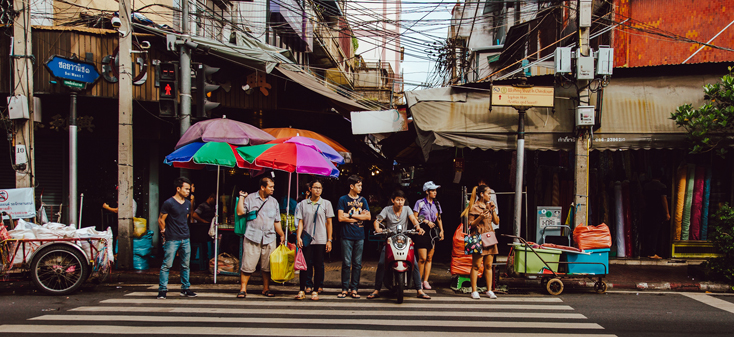
Connectivity and Borders in Southeast Asia
15 March 2018
The ASEAN Economic Community has entered into force, and we hear much about ASEAN’s connectivity agenda. At the same time, we are witnessing rising religious and other forms of nationalism in the region, and border tensions persist. How do ASEAN countries navigate this landscape, and what does it mean for politics, security, migration and infrastructure development in the region?
How does it tie into larger questions of nationalism and globalization? What, indeed, does a border mean in Southeast Asia—both land and maritime borders. In this context, how to manage conflicts arising from the realities of geography and borders?
Panellists
- Don Bobiash, Assistant-Deputy Minister Asia-Pacific, Global Affairs Canada
- Jonathan Head, Southeast Asia Correspondent, BBC News, Bangkok
- Kai Ostwald, Director, Centre for Southeast Asia Research, UBC
- Renée Mulligan, Board, Lawyers' Rights Watch Canada
- Scott Watson, Associate Professor and Chair, Political Science, UVic
Chairs
- Phil Calvert, CAPI Senior Research Fellow and former Canadian Ambassador to Thailand, Cambodia, and Laos
- Victor V. Ramraj, CAPI Director and Chair in Asia-Pacific Legal Relations and Professor of Law, University of Victoria
IV. Canada and Southeast Asia: Exploring the Challenges and Opportunities [November 2017]
9 November 2017
Southeast Asia is one of the world’s fastest growing economies, and for several decades Canada has taken a keen interest. But the region is not without its challenges, which Canadian businesses and diplomatic representatives continue to navigate. This session will examine Canada’s current opportunities and challenges in the region, including trade, investment, and human rights. It will discuss key questions, including what are the prospects for a Canada-ASEAN free trade agreement? How do NAFTA discussions affect Canada’s relationship with Southeast Asia? What are the opportunities for Canada, and how should Canada respond? Does Canada have the human capacity to engage with Southeast Asia? What are the geopolitical and human rights challenges of engaging with ASEAN? How should Canada balance its engagement with Southeast Asia and its commitment to human rights and social responsibility?
Panellists
- Marie-Louise Hannan, Ambassador of Canada to the Association of Southeast Asian Nations (via video link)
- Hugh Stephens, Distinguished Fellow with the Asia Pacific Foundation and Principal at Trans-Pacific Connections; CAPI Associate
- Jim Boutilier, Special Advisor on Asia-Pacific, Maritime Forces Pacific; CAPI Associate
- Dominique Spragg, VP Strategic Planning, Viking Air
- Andrew Doherty, Canada Director, Canada-ASEAN Business Council
- Kai Ostwald, Assistant Professor in the School of Public Policy and Global Affairs & the Department of Political Science, and Faculty Associate at the Institute of Asian Research, UBC
- Robyn Fila, International Programs Manager, Centre for Asia-Pacific Initiatives, University of Victoria
- Thanh Phan, PhD Candidate in Law & Society, Faculty of Law, and CIGI Doctoral Fellow, University of Victoria
- Theressa Etmanski, LLM Candidate in Law & Society, Faculty of Law, University of Victoria
Chairs
- Phil Calvert, CAPI Senior Research Fellow and former Canadian Ambassador to Thailand, Cambodia, and Laos
- Victor V. Ramraj, CAPI Director and Chair in Asia-Pacific Legal Relations and Professor of Law, University of Victoria
III. Ethnic Conflict and Peace-Building in Mynamar: The Rohingya Crisis and Beyond [April 2017]
II. The South China Sea and US-China-ASEAN Relations [February 2017]
The South China Sea and US-China-ASEAN Relations
02 February 2017
The South China Sea has steadily become a flashpoint in world politics, with China, the United States, and the member states of ASEAN having legal, political, economic, commercial, and military interests in the region. This session examined the background to the rising tensions in the region, beginning with a discussion of the South China Sea Arbitration Award on 12 July 2016, the rising tensions between the US, China, and ASEAN, and the legal, political, and economic implications of rising instability in the region two weeks into the Trump Administration in the United States.
Panellists
- Phil Calvert, CAPI Associate and former Canadian Ambassador to Thailand
- Gordon Houlden, Director of the China Institute, University of Alberta
- Ted McDorman, Professor of Law, University of Victoria
- Thomas J. Schoenbaum, Harold S. Shefelman Professor of Law, University of Washington
- Cindy Termorshuizen, Embassy of Canada to China, Beijing
- Brett Witthoeft, Maritime Forces Pacific, Department of Defense, Government of Canada
- James Boutilier, Maritime Forces Pacific, Department of Defense, Government of Canada
Chair
- Victor V. Ramraj, CAPI Director and Chair in Asia-Pacific Legal Relations and Professor of Law, University of Victoria
View the event poster:
I. Thailand's Political and Constitutional Future [November 2016]
CAPI's Southeast Asia in Global Context series is led by Phil Calvert, CAPI Senior Research Fellow and former Canadian Ambassador to Thailand, Cambodia, and Laos, and Victor V. Ramraj, CAPI Director and Chair in Asia-Pacific Legal Relations.




